Recent News
Environmental science scholarships awarded by BZSMonday, August 30, 2021
A group of environmental science students have had their hard work rewarded with scholarships from the Bermuda Zoological Society.
BZS Awards Steinhoff Scholarship & Pye Award
Tuesday, August 24, 2021
The Bermuda Zoological Society [BZS] has awarded the BZS Steinhoff Scholarship to Caroline Alexander, Isabella Murdoch, and Treiana Zuill, while Freyja Kermode was the recipient of the Pye award.
Collapse of seagrass beds threatens survival of marine life
Tuesday, August 17, 2021
The Bermuda Turtle Project is anxious to get back out onto the water this month to get a clearer picture of sea turtle abundance. Due to the restrictions brought upon us all by the pandemic, we have been unable to do any in-water research for nearly two years and it would appear, from observations, there have been some drastic changes in our marine environment.
Seagrass beds have ‘completely collapsed’ in last four years
Tuesday, August 17, 2021
Many acres of seagrass beds crucial for the survival of sea turtles and other marine life have “completely collapsed” over the last four years, according to a leading environmental group.
BZS’s Kids on the Reef programme: an insider’s look
Wednesday, August 11, 2021
The Bermuda Zoological Society recently completed its ninth year of the Kids on the Reef programme, which is generously sponsored by AXA XL. This year, the BZS sent Megan Dodd, a university student studying strategic communications and marketing, out with a student group so that she could provide a first-hand account of what the students experience and learn over the two-day programme.
About
GovernanceAbout Us
Newsletter
Latest News
Gift & Bookstore
Contact
General Inquiries
info@bzs.bm
Latest News
All the latest updates and news from the Bermuda Aquarium, Museum, and Zoo, one of Bermuda's leading visitor attractions!
Excerpt from WILD News April 2018
When new fish arrive at BAMZ, they must first undergo a minimum of 30 days quarantine in order to diagnose any marine parasites which, if left untreated, can infect the other inhabitants of the aquarium hall tanks.
On Thursday, 22nd March, Patrick Talbot, Curator of the Bermuda Aquarium, Museum and Zoo, with the assistance of Marine Collector, Jorge Sanchez, conducted the examination of the quarantined blue parrotfish, queen parrotfish, and rainbow parrotfish before their transfer into the display tanks.
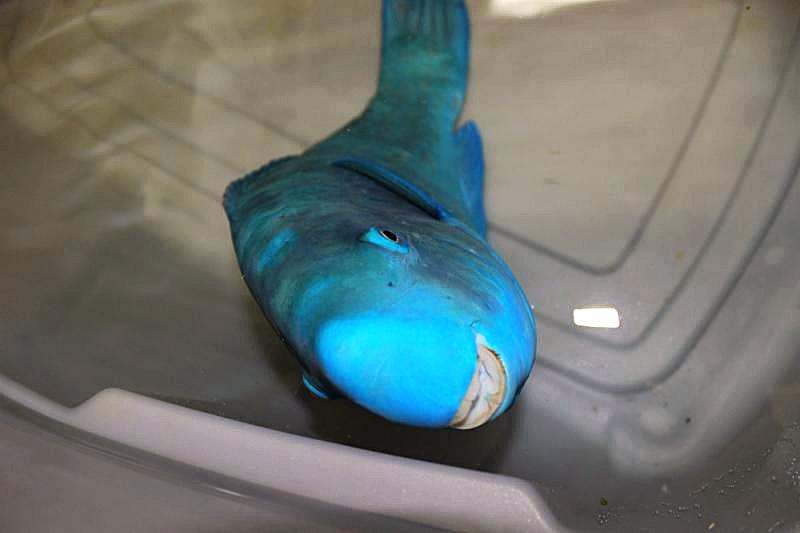
Blue parrotfish going under anesthetic
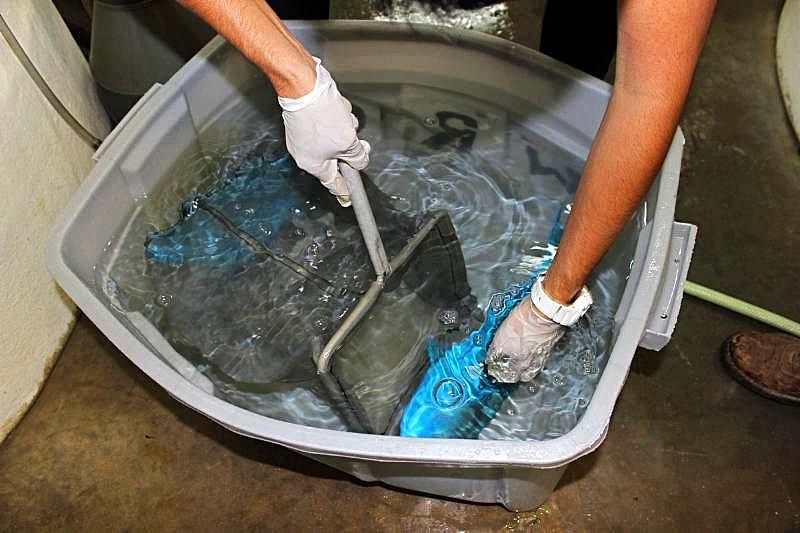
Blue parrotfish being removed from anesthetic
Before each fish was examined, they were first anesthetized in a solution rendering them unconscious and insensible to any pain. The length of time it took for each fish to go to sleep, was also the approximate amount of time it would remain sedated, giving Mr. Talbot an idea of how much time he had to take samples from the fish.
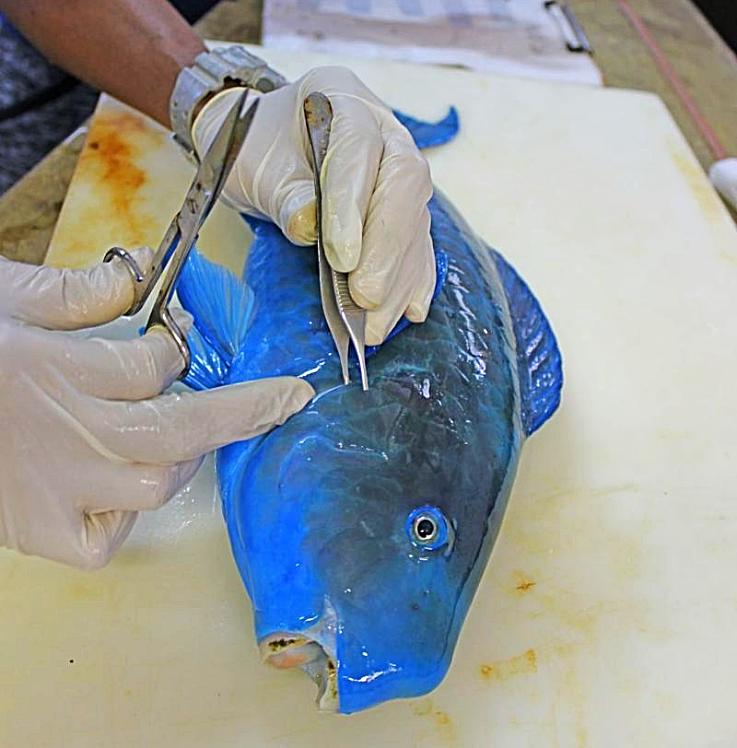
Blue parrotfish having its gills clipped
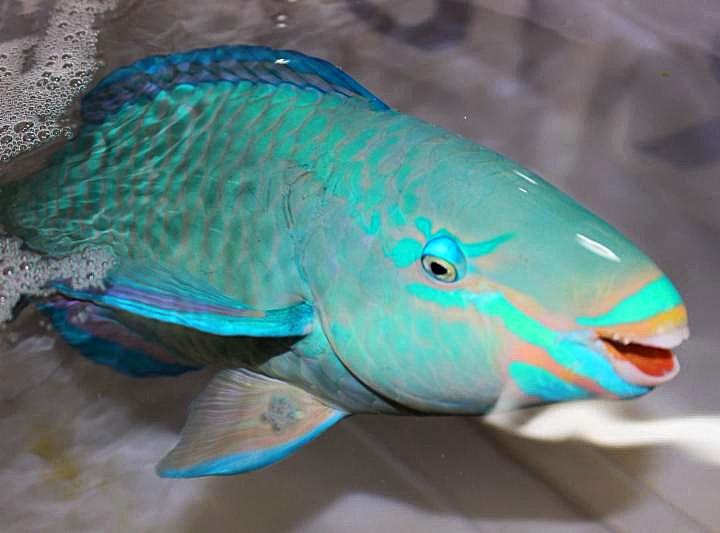
Queen parrotfish going under anesthetic
Each fish went through the same procedure; after sedation, they were removed from the water and placed on a cushion wrapped in plastic. Mr. Talbot quickly took a scale scrape, and a gill clipping - basically taking a sample of the skin mucous covering the scales and a tiny gill biopsy. The fish was then placed in a tub of fresh water, and Mr. Sanchez bubbled oxygen in the water surrounding the gills. The fresh water acted as final medication of sorts, as it would kill most external parasites (should there be any) and the bubbled gas helped ensure the fish had oxygen during its recovery from the anesthetic. After a few minutes, the animal was responsive and returned to a separate tank to await results of the procedure.
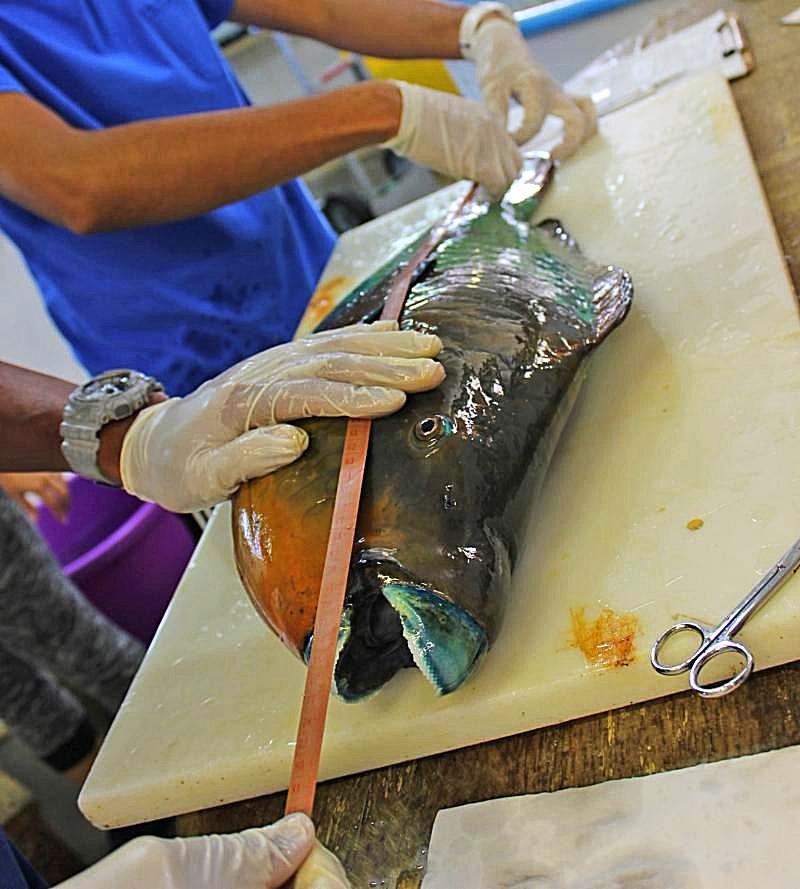
Rainbow parrotfish being measured
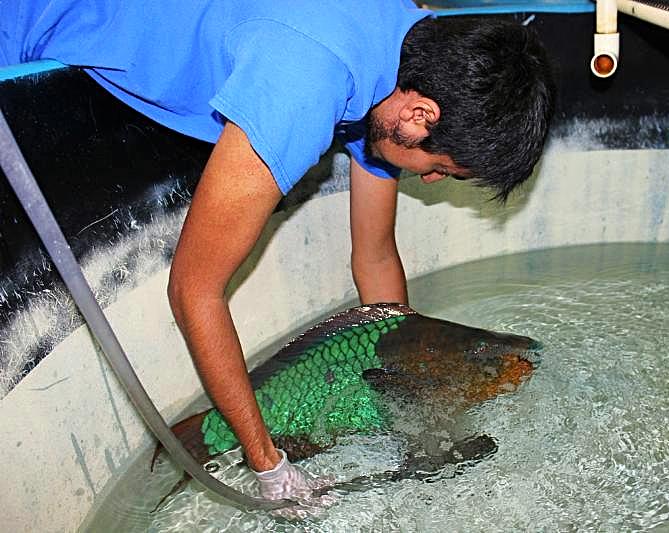
Mr. Sanchez running oxygen over the Rainbow parrotfish gills to aid in its recovery from the anesthetic
Once all the fish were sampled, Mr. Talbot took the scale scrapings and the gill clippings into the laboratory to be examined under a microscope for parasites infections, such as protozoa. If a parasite was found on either sample, the fish would have to go through another two weeks of quarantine and further treatment.
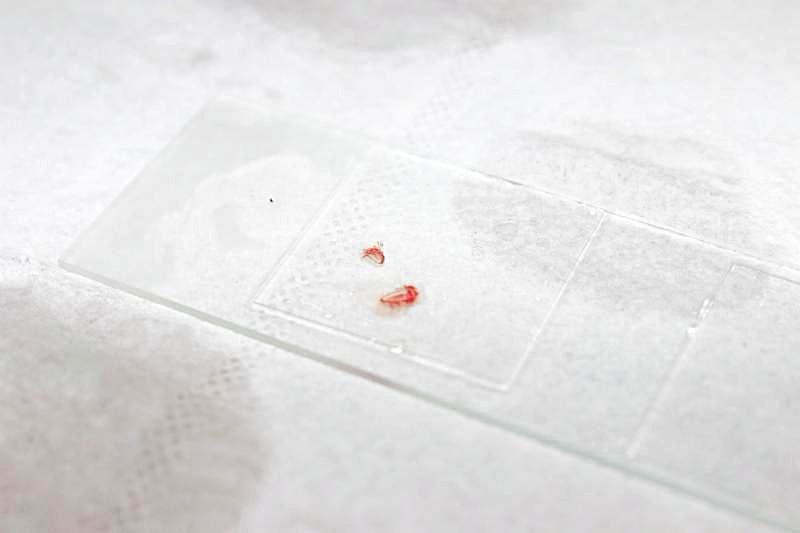
Gill clippings on a slide ready to be examined under a microscope
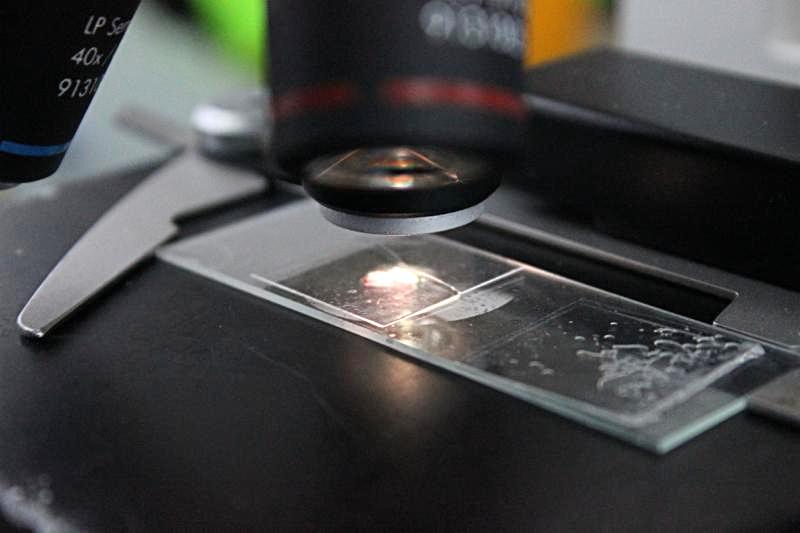
Gill clippings being examined
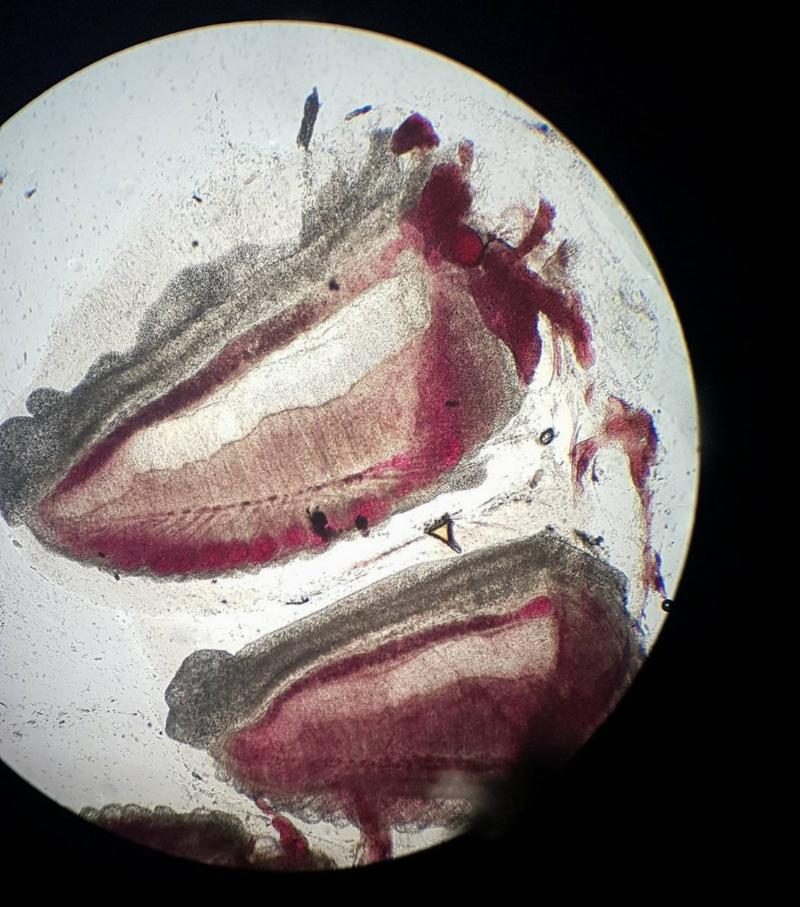
400x magnification of gill clippings
Thankfully, upon completion of the examination, all three fish were parasite free and received a clean bill of health. The queen and blue parrotfish were placed in the parrotfish habitat in the Aquarium Hall, and the rainbow parrotfish was placed in the North Rock habitat.
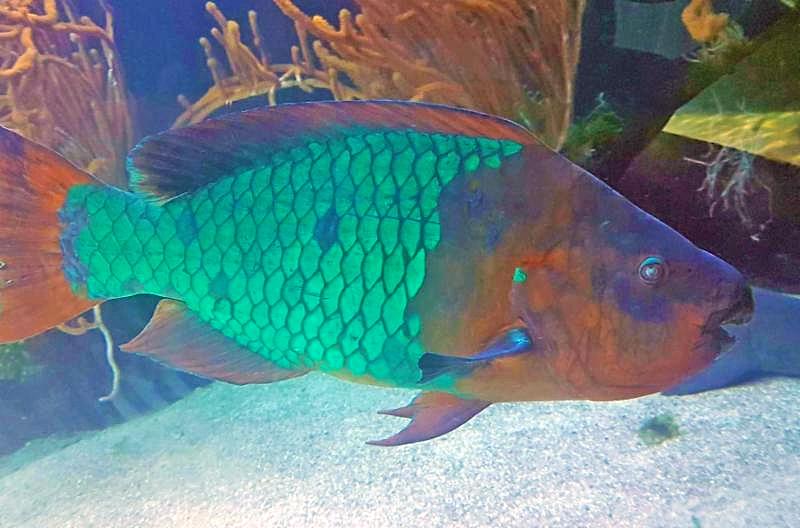
Rainbow parrotfish in the North Rock habitat
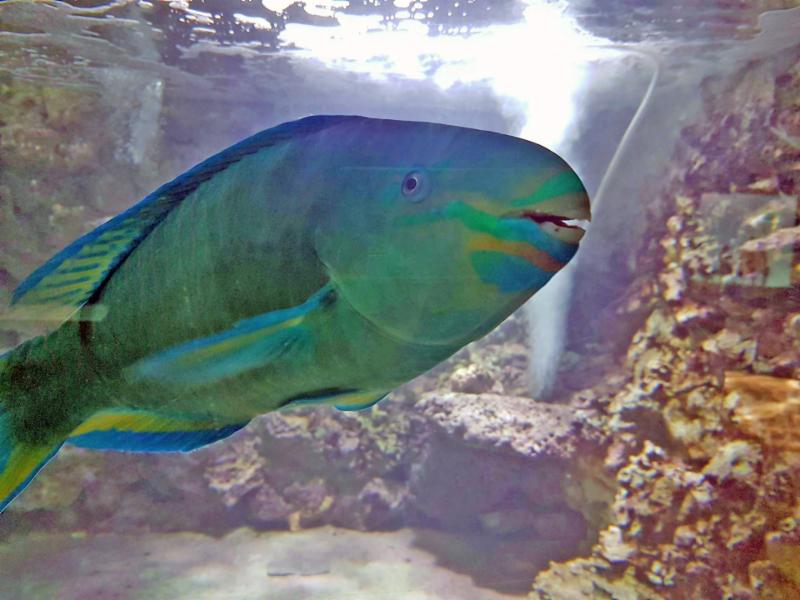
Queen parrotfish in the parrotfish habitat


